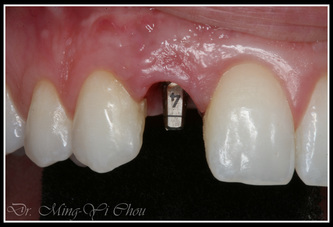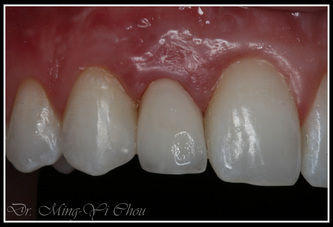Dental Implants
Implants are substitutes for teeth and they are today's best alternative to your natural teeth. They offer you a permanent or secure solution for replacing one or more teeth. They are made of biocompatible materials, just the same as hip implants or similar orthopedic devices, and function as anchors or support for traditional forms of dentistry, such as crowns, bridges or dentures.
If you lose one or more teeth due to periodontal disease, or another cause, there is hope. Dental implants are changing the way people live! They are designed to provide a foundation for replacement teeth that look, feel, and function like natural teeth. The person who has lost teeth regains the ability to eat virtually anything and can smile with confidence, knowing that teeth appear natural and that facial contours will be preserved. Patients with dental implants can smile with confidence.
What are Dental Implants?
Dental implants are designed to provide a foundation for replacement teeth that look, feel, and function like natural teeth. The person who has lost teeth regains the ability to eat virtually anything and can smile with confidence, knowing that teeth appear natural and that facial contours will be preserved. The implants themselves are tiny titanium posts that are surgically placed into the jawbone where teeth are missing. These metal anchors act as tooth root substitutes.
The bone bonds with the titanium, creating a strong foundation for artificial teeth. Small posts that protrude through the gums are then attached to the implant. These posts provide stable anchors for artificial replacement teeth. Dental implants also help preserve facial structure, preventing the bone deterioration that occurs when teeth are missing.
If, like many others, you feel implant dentistry is the choice for you, we ask that you undergo a dental/radiographic examination and health history. During these consultation visits, Dr. Chou will address your specific needs and considerations. Your questions and concerns are important to us and our team will work with you very closely to help make your procedure a success.
We will also discuss fees and insurance at this time. There are many types of insurance plans, and coverage for implants is varied. We will be happy to assist you in obtaining any benefits to which you may be entitled.
The Surgical Procedure
For most patients, the placement of dental implants involves two surgical procedures. First, implants are placed within your jawbone. Healing time following surgery varies from person to person and is based on a variety of factors, such as hardness of bone. In some cases, implants may be restored immediately after they are placed.
It is crucial that proper design of the final prosthesis is planned prior to the surgery. A surgical guide/stent may need to be fabricated to guide the placement of the dental implant. It is imperative that the implant locations are determined by the locations of the final teeth. Once integrated, the positions of the implants can no longer be altered inside the jaw bone.
For the first three to six months following the surgery, dental implants are beneath the surface of the gums gradually bonding with the jawbone. You should be able to wear temporary dentures and eat a soft diet at this time.
After the implants have integrated with the jawbone, the second phase begins. Dr. Chou will uncover the implants and attach a small healing cap/abutment. After two weeks, Dr. Chou will be able to start making your new teeth. An impression/mold of the implants will be made at this time. Then posts or final abutments can then be connected to the implants. The teeth replacements are then made over the posts or abutments. The entire procedure usually takes six to eight months. Most patients do not experience any disruption in their daily life.
What Types of Prosthesis are Available?
A single prosthesis (crown) is used to replace one missing tooth – each prosthetic tooth attaches to its own implant. A partial prosthesis (fixed bridge) can replace two or more teeth and may require only two or three implants. A complete dental prosthesis (fixed bridge) replaces all the teeth in your upper or lower jaw. The number of implants varies depending upon which type of complete prosthesis (removable or fixed) is recommended. A removable prosthesis (over denture) attaches to a bar or ball in socket attachments, whereas a fixed prosthesis is permanent and removable only by a professional.
Dr. Chou performs in-office dental implant surgery. Dr. Chou has received extensive training in Dental Implantology as part of her training in the specialty of Prosthodontics.
If you lose one or more teeth due to periodontal disease, or another cause, there is hope. Dental implants are changing the way people live! They are designed to provide a foundation for replacement teeth that look, feel, and function like natural teeth. The person who has lost teeth regains the ability to eat virtually anything and can smile with confidence, knowing that teeth appear natural and that facial contours will be preserved. Patients with dental implants can smile with confidence.
What are Dental Implants?
Dental implants are designed to provide a foundation for replacement teeth that look, feel, and function like natural teeth. The person who has lost teeth regains the ability to eat virtually anything and can smile with confidence, knowing that teeth appear natural and that facial contours will be preserved. The implants themselves are tiny titanium posts that are surgically placed into the jawbone where teeth are missing. These metal anchors act as tooth root substitutes.
The bone bonds with the titanium, creating a strong foundation for artificial teeth. Small posts that protrude through the gums are then attached to the implant. These posts provide stable anchors for artificial replacement teeth. Dental implants also help preserve facial structure, preventing the bone deterioration that occurs when teeth are missing.
If, like many others, you feel implant dentistry is the choice for you, we ask that you undergo a dental/radiographic examination and health history. During these consultation visits, Dr. Chou will address your specific needs and considerations. Your questions and concerns are important to us and our team will work with you very closely to help make your procedure a success.
We will also discuss fees and insurance at this time. There are many types of insurance plans, and coverage for implants is varied. We will be happy to assist you in obtaining any benefits to which you may be entitled.
The Surgical Procedure
For most patients, the placement of dental implants involves two surgical procedures. First, implants are placed within your jawbone. Healing time following surgery varies from person to person and is based on a variety of factors, such as hardness of bone. In some cases, implants may be restored immediately after they are placed.
It is crucial that proper design of the final prosthesis is planned prior to the surgery. A surgical guide/stent may need to be fabricated to guide the placement of the dental implant. It is imperative that the implant locations are determined by the locations of the final teeth. Once integrated, the positions of the implants can no longer be altered inside the jaw bone.
For the first three to six months following the surgery, dental implants are beneath the surface of the gums gradually bonding with the jawbone. You should be able to wear temporary dentures and eat a soft diet at this time.
After the implants have integrated with the jawbone, the second phase begins. Dr. Chou will uncover the implants and attach a small healing cap/abutment. After two weeks, Dr. Chou will be able to start making your new teeth. An impression/mold of the implants will be made at this time. Then posts or final abutments can then be connected to the implants. The teeth replacements are then made over the posts or abutments. The entire procedure usually takes six to eight months. Most patients do not experience any disruption in their daily life.
What Types of Prosthesis are Available?
A single prosthesis (crown) is used to replace one missing tooth – each prosthetic tooth attaches to its own implant. A partial prosthesis (fixed bridge) can replace two or more teeth and may require only two or three implants. A complete dental prosthesis (fixed bridge) replaces all the teeth in your upper or lower jaw. The number of implants varies depending upon which type of complete prosthesis (removable or fixed) is recommended. A removable prosthesis (over denture) attaches to a bar or ball in socket attachments, whereas a fixed prosthesis is permanent and removable only by a professional.
Dr. Chou performs in-office dental implant surgery. Dr. Chou has received extensive training in Dental Implantology as part of her training in the specialty of Prosthodontics.



